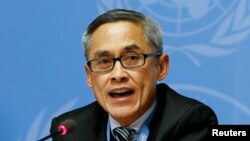African states narrowly failed Monday for a second time to halt the work of the first U.N. independent investigator appointed to help protect gay and transgender people worldwide from violence and discrimination.
The attempt was voted down in the U.N. General Assembly 84 to 77 with 16 abstentions, a month after African states made a similar unsuccessful move in the General Assembly's third committee, which deals with human rights.
The 47-member U.N. Human Rights Council, based in Geneva, created the position in June and in September appointed Vitit Muntarbhorn of Thailand, who has a three-year mandate to investigate abuses against lesbian, gay, bisexual, transgender and intersex (LGBTI) people.
Being gay is a crime in at least 73 countries, the U.N. has said. The issue of gay rights consistently sparks heated debate at the United Nations.
U.S. Ambassador to the United Nations Samantha Power said the bid by the African states on Monday was "rooted in a real disagreement over whether people of a certain sexual orientation and gender identity are in fact entitled to equal rights."
"And it is being driven by a group of U.N. member states that believe it is acceptable to treat people differently because of who they are or who they love," she told the General Assembly.
Russia, several African countries and Egypt, speaking on behalf of the 57-member Organization of Islamic Cooperation, said last month they would not recognize the mandate of the gay rights investigator and would not cooperate with Muntarbhorn.
Last week, Russia prevented the United Nations Security Council from thanking outgoing Secretary-General Ban Ki-moon specifically for promoting gay rights during his decade in office, diplomats said.
In 2014, Ban said the U.N. would recognize all same-sex marriages of its staff, allowing them to receive U.N. benefits. Russia unsuccessfully tried to overturn it last year, with Saudi Arabia, China, Iran, India, Egypt, Pakistan, and Syria among 43 states that supported Moscow.
In February, the African Group, the Organization of Islamic Cooperation and the 25-member Group of Friends of the Family, led by Egypt, Belarus and Qatar, protested the launch of six U.N. stamps promoting LGBT equality.










